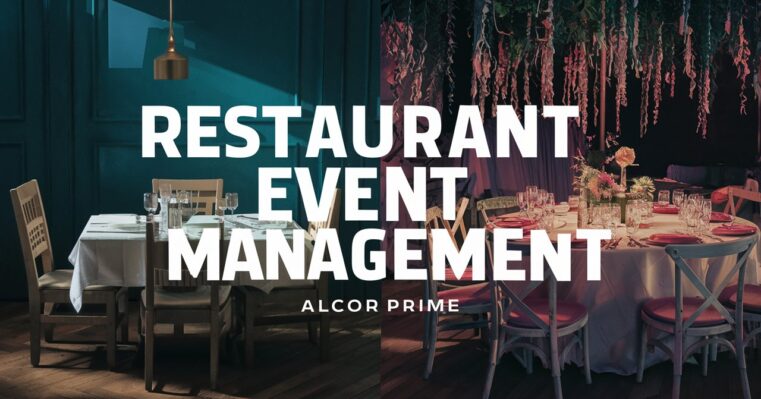Welcome to the world of restaurant event management, where meals are not just about satisfying hunger but creating unforgettable experiences. In today's highly competitive hospitality industry, it takes more than just good food to stand out. Customers seek unique and memorable dining experiences, and that is where restaurant event management comes in. From small private gatherings to large-scale corporate events, this field is all about planning, organizing, and executing successful events that leave a lasting impression on guests. In this article, we will dive deep into the world of restaurant event management and explore its importance, key components, and best practices.

The Importance of Restaurant Event Management
Restaurant event management is crucial for the success and growth of any dining establishment. Here are some key reasons why:
Enhances Customer Experience
In today's digital age, customers have endless options when it comes to dining out. To keep them coming back, restaurants need to offer more than just good food. Event management allows them to create unique and personalized experiences that set them apart from their competitors. Whether it's a themed dinner or a wine pairing event, these special occasions give customers something to look forward to and help build brand loyalty.
Increases Revenue Opportunities
Event management can also be a lucrative source of revenue for restaurants. By hosting events, they can attract new customers and encourage repeat business while generating additional income from ticket sales or customized menus. With careful planning and execution, restaurants can see a significant boost in their bottom line through event management.
Builds Brand Image
A well-planned and executed event can do wonders for a restaurant's brand image. It showcases their creativity, attention to detail, and commitment to providing exceptional customer experiences. A successful event can generate positive word-of-mouth marketing, social media buzz, and media coverage, all of which contribute to building a strong brand image.
Key Components of Successful Restaurant Event Management
Now that we understand the importance of restaurant event management let's explore its key components:
Planning and Organization
The first step in event management is to plan and organize. This involves identifying the purpose of the event, setting a budget, selecting a date and venue, creating a guest list, and determining the type of event (e.g., sit-down dinner, buffet, cocktail party). The success of an event depends greatly on careful planning and organization.
Marketing and Promotion
Marketing and promotion are essential for attracting guests to an event. Restaurants can use various channels such as social media, email marketing, and partnerships with local businesses to spread the word about their event. They can also offer early bird discounts or special packages to encourage ticket sales.
Event Execution
On the day of the event, it's crucial to have a skilled team in place to manage all aspects of the event, including set-up, food and beverage service, and guest interactions. Attention to detail is key to ensuring a seamless and enjoyable experience for guests.
Post-event Follow-up
After the event, restaurants should follow up with attendees to gather feedback, thank them for their participation, and promote future events. This helps to build a relationship with customers and encourages them to attend future events.
Best Practices for Restaurant Event Management
Here are some best practices that can help restaurants successfully plan and execute events:
Understand Your Target Audience
Before planning an event, it's crucial to understand your target audience and their preferences. For example, if your target audience is the corporate crowd, you may want to focus on networking events or business luncheons rather than family-oriented events.
Create a Theme
A theme adds a unique touch to an event and makes it more memorable for guests. It could be anything from a specific cuisine to a holiday or season. A well-executed theme ties all elements of an event together and creates a cohesive and immersive experience.
Partner with Local Businesses
Collaborating with local businesses can help boost the success of an event. For example, partnering with a winery for a wine pairing dinner or a dessert shop for a dessert buffet can add value to the event and attract a wider audience.
How to Use Restaurant Event Management: A Practical Guide
Now that we have covered the basics of restaurant event management let's explore how it can be used in practice. Here are some examples:
- A fine dining restaurant might offer special chef's table dinners where guests can interact with the chef and enjoy a customized menu.
- A casual restaurant could host weekly trivia nights or game nights to attract a younger crowd.
- A family-friendly restaurant could organize holiday-themed events such as a visit from Santa during Christmas or an Easter egg hunt.
Examples of Successful Restaurant Events
There are numerous examples of successful restaurant events that have left a mark on customers. Here are a few notable ones:
- The Cheesecake Factory's annual "Dine Out to Make a Difference" event, where a portion of the proceeds from a designated day goes towards Feeding America, a non-profit organization.
- McDonald's Shamrock Shake fundraiser for the Ronald McDonald House Charities, where a portion of the proceeds from every Shamrock Shake sold goes towards supporting families with sick children.
- Olive Garden's "Never Ending Pasta Bowl" promotion, where customers can enjoy unlimited pasta dishes for a flat fee during a specific time period.
Comparing Restaurant Event Management with Traditional Restaurant Operations
Traditional restaurant operations focus on providing a consistent dining experience for customers. In contrast, restaurant event management involves creating unique and memorable experiences. While traditional operations may center around daily tasks such as food preparation and service, event management requires long-term planning and coordination. Both are essential for the success of a restaurant, but they serve different purposes and require different skills.
Top Tips for Successful Restaurant Event Management
Here are some tips to help restaurants excel at event management:
- Stay organized by creating a checklist and timeline for each event.
- Collaborate with other departments within the restaurant to ensure a seamless experience.
- Keep track of expenses and stick to a budget.
- Offer timely and friendly customer service to guests.
- Gather feedback to continuously improve and innovate.

FAQs about Restaurant Event Management
What type of events can be organized in a restaurant?
There is no limit to the type of events that can be organized in a restaurant. Some common examples include private parties, corporate events, holiday-themed events, and wine dinners.
How far in advance should I plan an event?
The ideal time to start planning an event depends on its size and complexity. For small events, 2-3 months in advance should suffice, while larger events may require 6-8 months of planning.
What are some cost-saving measures for restaurant events?
A few ways to save costs when organizing events include partnering with local businesses, offering early bird discounts, and optimizing menu items for cost efficiency.
Can restaurants use technology to assist with event management?
Yes, there are various software and applications available that can help with tasks such as guest list management, marketing, and ticket sales.
How can restaurants handle dietary restrictions for events?
Restaurants should always ask for any dietary restrictions when guests RSVP to an event. It's also helpful to have a few vegetarian or gluten-free options on the menu to accommodate these needs.
Conclusion: Elevating the Dining Experience through Restaurant Event Management
In conclusion, restaurant event management is a crucial component of successful dining establishments. By planning and executing unique and memorable events, restaurants can enhance the customer experience, increase revenue opportunities, and build a strong brand image. With careful planning, execution, and attention to detail, restaurant event management can take dining experiences to the next level and leave a lasting impression on customers. So, whether you're a restaurant owner or a customer looking for a unique dining experience, keep an eye out for the next restaurant event in your area!






